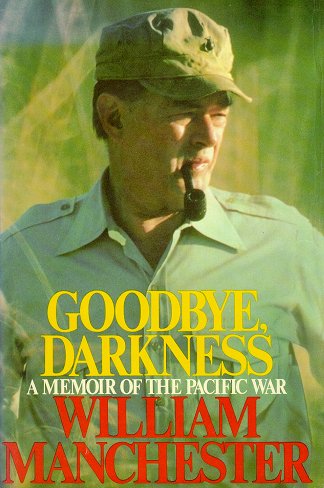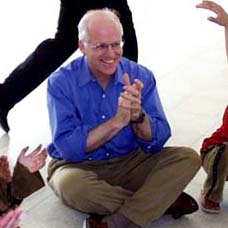2006.10.16: October 16, 2006: Headlines: COS - Peru: WWII: Greatest Generation: Military: Amazon: Peru RPCV Hugh Pickens writes: "Goodbye Darkness" is a Powerful Memoir that explains the "Greatest Generation"
Peace Corps Online:
Peace Corps News:
Peace Corps Library:
Legacy:
June 1, 2004: Headlines: History: Legacy: Seattle Post Intelligencer: Historian and Kennedy Biographer William Manchester dies at 82 :
2006.10.16: October 16, 2006: Headlines: COS - Peru: WWII: Greatest Generation: Military: Amazon: Peru RPCV Hugh Pickens writes: "Goodbye Darkness" is a Powerful Memoir that explains the "Greatest Generation"
Peru RPCV Hugh Pickens writes: "Goodbye Darkness" is a Powerful Memoir that explains the "Greatest Generation"

"The book bears more than a superficial resemblance to another favorite book, "Zen and the Art of Motorcycle Maintenance," that is also a journey into darkness to discover the author's shadow self. Both books are written in first person, both recount a journey each author makes to places he had been before, both describe the memories that each author rediscovers during the journey, and both books end with the startling realization that the younger protagonist of the book and the author are one and the same. While Pirsig makes a motorcycle trip to Montana to a college where he taught before he had a nervous breakdown and was subjected to electroshock treatments that caused him to "lose" his memory, Manchester tells the story of his journey thirty years afterwards to the battlefields where he fought and of the battle wound that had made his subsequent memories "unreliable." "
Peru RPCV Hugh Pickens writes: "Goodbye Darkness" is a Powerful Memoir that explains the "Greatest Generation"
A Powerful Memoir that explains the "Greatest Generation",
October 16, 2006
Reviewer: Hugh Pickens (Baltimore, MD USA) - See all my reviews
To me "Goodbye Darkness" although on one level a memoir of the author's service in the US Marine Corps in the Pacific Theatre during World War II is really a journey of discovery of who the author is and the belief system that formed him during the 1930's and 1940's. The literary device he uses of revisiting the battlefields where he fought and rediscovering the memories he had suppressed for thirty years makes this one of the most powerful books I have ever read.
The book bears more than a superficial resemblance to another favorite book, "Zen and the Art of Motorcycle Maintenance," that is also a journey into darkness to discover the author's shadow self. Both books are written in first person, both recount a journey each author makes to places he had been before, both describe the memories that each author rediscovers during the journey, and both books end with the startling realization that the younger protagonist of the book and the author are one and the same. While Pirsig makes a motorcycle trip to Montana to a college where he taught before he had a nervous breakdown and was subjected to electroshock treatments that caused him to "lose" his memory, Manchester tells the story of his journey thirty years afterwards to the battlefields where he fought and of the battle wound that had made his subsequent memories "unreliable."
There were a wealth of insights from "Goodbye Darkness" but three bear special mention. First, as a member of the baby boom generation (born in 1949), I grew up in the shadow of the "greatest generation" and have tried to understand the historical forces that formed my father's generation - the great depression and World War II. Manchester's memoir has helped me understand what it was like to grow up as a product of those two defining events of the 1930's and 1940's and why the world they returned to became so different from the one they had left.
My second insight from the book was an appreciation of the strength of the bond Manchester formed with the men in his platoon and the process of group cohesion that formed the bond that would motivate the men in his unit to fight not for their country, not for ideals, but for each other. It is a truism that the men who returned from WWII rarely discussed the experience they had undergone on the battlefield. Manchester is the exception in his desire and his ability to explain why men fought. By the end of the book I knew each of the men in his platoon and understood the process that made their loyalty to each other so strong.
I had seen the process of group cohesion myself in the 1970's to a lesser degree when I went through an intense fifteen month month training regimen followed by two years service as a Peace Corps Volunteer in South America when I formed friendships with my fellow volunteers that have lasted thirty years. I am now at the same age as Manchester when he made his journey to the Pacific that resulted in this book and his memoir has given me the idea of making my own journey back to Peru to revisit the places I served and rediscover the memories that formed me as a young man.
My third insight was the role that their lives in combat played in their subsequent lives. My special interest has always been the Peace Corps. I have long known that the fathers of the Peace Corps, John F. Kennedy and Sargent Shriver, both saw combat in World War II as did many other "Peace Corps Giants" like Jack Vaughn who fought in the Marines in the Philippines and who, at 85, is now the last surviving member of his platoon. It was Manchester's service in WWII that gave him the impetus to become one of the greatest historians of his generation. No one hates war more than a veteran and it was because they hated war that out of their sacrifice men like Kennedy, Shriver, and Vaughn sustained institutions like the United Nations and created organizations like the Peace Corps.
Highly recommended.
When this story was posted in October 2006, this was on the front page of PCOL:





Peace Corps Online The Independent News Forum serving Returned Peace Corps Volunteers
 | Chris Dodd's Vision for the Peace Corps
Senator Chris Dodd (RPCV Dominican Republic) spoke at the ceremony for this year's Shriver Award and elaborated on issues he raised at Ron Tschetter's hearings. Dodd plans to introduce legislation that may include: setting aside a portion of Peace Corps' budget as seed money for demonstration projects and third goal activities (after adjusting the annual budget upward to accommodate the added expense), more volunteer input into Peace Corps operations, removing medical, healthcare and tax impediments that discourage older volunteers, providing more transparency in the medical screening and appeals process, a more comprehensive health safety net for recently-returned volunteers, and authorizing volunteers to accept, under certain circumstances, private donations to support their development projects. He plans to circulate draft legislation for review to members of the Peace Corps community and welcomes RPCV comments. |
 | He served with honor
One year ago, Staff Sgt. Robert J. Paul (RPCV Kenya) carried on an ongoing dialog on this website on the military and the peace corps and his role as a member of a Civil Affairs Team in Iraq and Afghanistan. We have just received a report that Sargeant Paul has been killed by a car bomb in Kabul. Words cannot express our feeling of loss for this tremendous injury to the entire RPCV community. Most of us didn't know him personally but we knew him from his words. Our thoughts go out to his family and friends. He was one of ours and he served with honor. |
 | Chris Shays Shifts to Favor an Iraq Timetable
In a policy shift, RPCV Congressman Chris Shays, long a staunch advocate of the Bush administration's position in Iraq, is now proposing a timetable for a withdrawal of American troops. How Mr. Shays came to this change of heart is, he says, a matter of a newfound substantive belief that Iraqis need to be prodded into taking greater control of their own destiny under the country’s newly formed government. As Chairman of the House Government Reform subcommittee on national security, he plans to draft a timetable for a phased withdrawal and then push for its adoption. A conscientious objector during the Vietnam War who said that if drafted he would not serve, Chris Shays has made 14 trips to Iraq and was the first Congressman to enter the country after the war - against the wishes of the Department of Defense. |
 | Peace Corps' Screening and Medical Clearance
The purpose of Peace Corps' screening and medical clearance process is to ensure safe accommodation for applicants and minimize undue risk exposure for volunteers to allow PCVS to complete their service without compromising their entry health status. To further these goals, PCOL has obtained a copy of the Peace Corps Screening Guidelines Manual through the Freedom of Information Act (FOIA) and has posted it in the "Peace Corps Library." Applicants and Medical Professionals (especially those who have already served as volunteers) are urged to review the guidelines and leave their comments and suggestions. Then read the story of one RPCV's journey through medical screening and his suggestions for changes to the process. |
 | The Peace Corps is "fashionable" again
The LA Times says that "the Peace Corps is booming again and "It's hard to know exactly what's behind the resurgence." PCOL Comment: Since the founding of the Peace Corps 45 years ago, Americans have answered Kennedy's call: "Ask not what your country can do for you--ask what you can do for your country. My fellow citizens of the world: ask not what America will do for you, but what together we can do for the freedom of man." Over 182,000 have served. Another 200,000 have applied and been unable to serve because of lack of Congressional funding. The Peace Corps has never gone out of fashion. It's Congress that hasn't been keeping pace. |
 | PCOL readership increases 100%
Monthly readership on "Peace Corps Online" has increased in the past twelve months to 350,000 visitors - over eleven thousand every day - a 100% increase since this time last year. Thanks again, RPCVs and Friends of the Peace Corps, for making PCOL your source of information for the Peace Corps community. And thanks for supporting the Peace Corps Library and History of the Peace Corps. Stay tuned, the best is yet to come. |
 | History of the Peace Corps
PCOL is proud to announce that Phase One of the "History of the Peace Corps" is now available online. This installment includes over 5,000 pages of primary source documents from the archives of the Peace Corps including every issue of "Peace Corps News," "Peace Corps Times," "Peace Corps Volunteer," "Action Update," and every annual report of the Peace Corps to Congress since 1961. "Ask Not" is an ongoing project. Read how you can help. |
Read the stories and leave your comments.

Some postings on Peace Corps Online are provided to the individual members of this group without permission of the copyright owner for the non-profit purposes of criticism, comment, education, scholarship, and research under the "Fair Use" provisions of U.S. Government copyright laws and they may not be distributed further without permission of the copyright owner. Peace Corps Online does not vouch for the accuracy of the content of the postings, which is the sole responsibility of the copyright holder.
Story Source: Amazon
This story has been posted in the following forums: : Headlines; COS - Peru; WWII; Greatest Generation; Military
PCOL34768
05

















